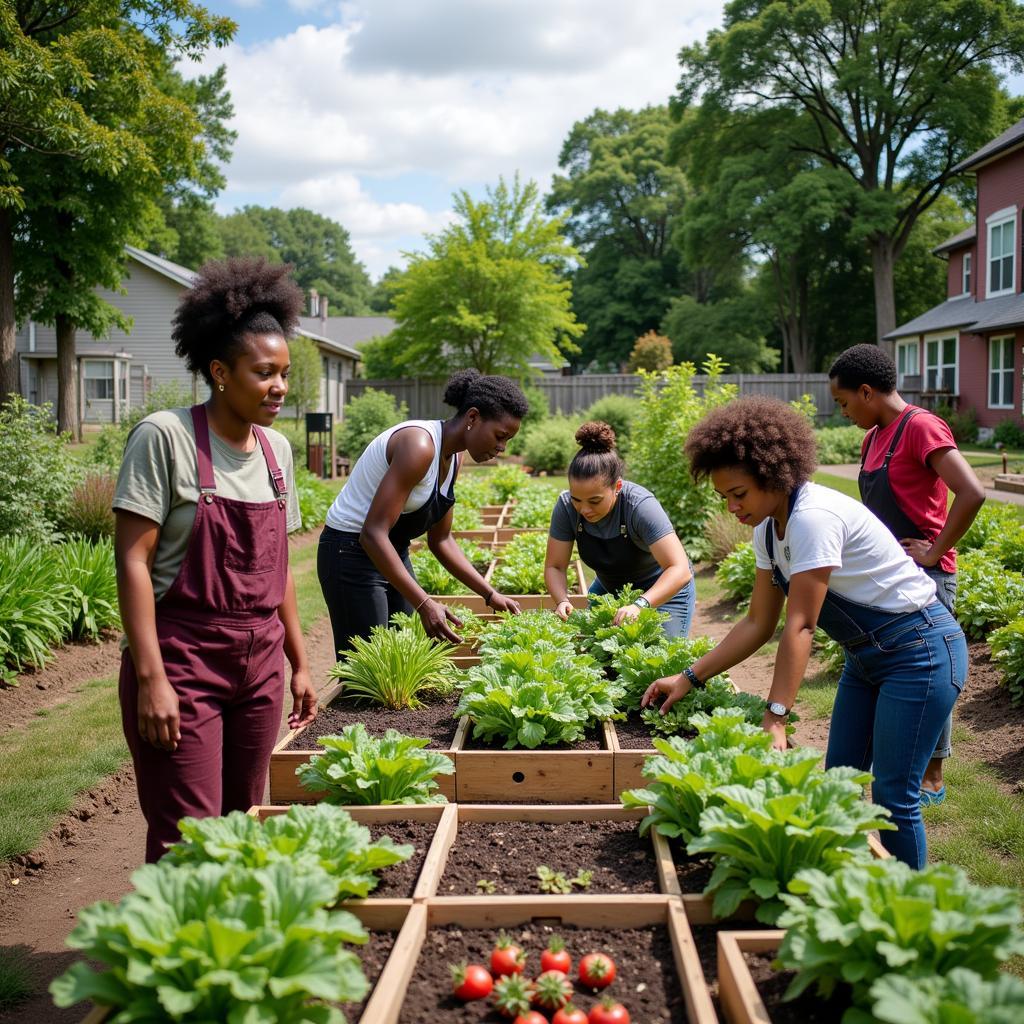Food Justice Jobs represent a powerful way to combine your passion for food with a commitment to social change. These roles address systemic inequities within the food system, striving for a world where everyone has access to healthy, affordable, and culturally appropriate food. Whether you’re a seasoned professional or just starting your career, exploring food justice jobs can be a fulfilling journey.  People working together in a community garden, demonstrating food justice in action.
People working together in a community garden, demonstrating food justice in action.
What are Food Justice Jobs?
Food justice jobs encompass a broad range of roles that aim to create a more equitable food system. They go beyond simply providing food to those in need; they address the root causes of food insecurity, such as poverty, discrimination, and lack of access to resources. From urban farming to food policy advocacy, these jobs tackle issues at every level of the food chain.
Different Types of Food Justice Jobs
Food justice work takes many forms, offering diverse career paths for individuals with varying skills and interests. Some examples include:
- Community Garden Coordinator: These individuals manage and maintain community gardens, providing spaces for people to grow their own food and connect with their neighbors.
- Food Policy Analyst: Analysts research and analyze food policies, advocating for changes that promote food justice and equity.
- Nutrition Educator: Educators teach communities about healthy eating habits and cooking skills, empowering them to make informed food choices.
- Urban Farmer: Urban farmers cultivate crops in urban environments, increasing access to fresh produce in underserved communities. They often work with community members to promote food sovereignty and build local food systems.
Why Pursue a Career in Food Justice?
For many, a career in food justice is more than just a job; it’s a calling. The work is challenging but deeply rewarding, offering the opportunity to make a tangible difference in people’s lives.
Making a Difference in Your Community
Food justice jobs are inherently community-focused. They allow you to work directly with individuals and families, addressing their immediate needs while also working towards long-term systemic change. If you’re passionate about community building and social justice, a food justice career can be an incredibly fulfilling path. Check out the national food policy conference for more information on food policy and its impact.
Building a Sustainable Future
Food justice is intrinsically linked to sustainability. By promoting local food systems, reducing food waste, and advocating for environmentally sound agricultural practices, food justice workers are building a more sustainable future for all.
How to Find Food Justice Jobs
Finding the right food justice job requires research and networking. Here are some tips to get you started:
- Explore Online Resources: Websites like Food First and the National Sustainable Agriculture Coalition offer job boards and resources for food justice professionals.
- Network with Organizations: Attend conferences, workshops, and events related to food justice. Connect with organizations working in the field and inquire about job opportunities. You might even find opportunities related to food sovereignty jobs.
- Volunteer or Intern: Gaining hands-on experience through volunteering or internships can be invaluable. It allows you to learn about different aspects of food justice work and build connections within the field. You can also explore options like chester county food bank jobs or food bank dietitian jobs for valuable experience.
 People participating in a food justice advocacy workshop, learning how to advocate for change.
People participating in a food justice advocacy workshop, learning how to advocate for change.
Conclusion: Join the Food Justice Movement
Food justice jobs offer a unique opportunity to contribute to a more just and sustainable world. By addressing the root causes of food insecurity and promoting equitable access to healthy food, these roles play a vital part in building stronger, healthier communities. Are you ready to make a difference? Explore the diverse landscape of food justice jobs and discover how you can contribute to this important movement. Consider attending the control food control people conference to gain a deeper understanding of the complexities of food systems.
FAQ
- What qualifications are needed for food justice jobs?
- How can I gain experience in food justice?
- What are the biggest challenges facing the food justice movement?
- What are some examples of successful food justice initiatives?
- How can I get involved in food justice advocacy?
- Where can I find more information about food justice organizations?
- What are the long-term goals of the food justice movement?
For further assistance, please contact us at Phone Number: 02437655121, Email: minacones@gmail.com or visit our address: 3PGH+8R9, ĐT70A, thôn Trung, Bắc Từ Liêm, Hà Nội, Việt Nam. We have a 24/7 customer service team.